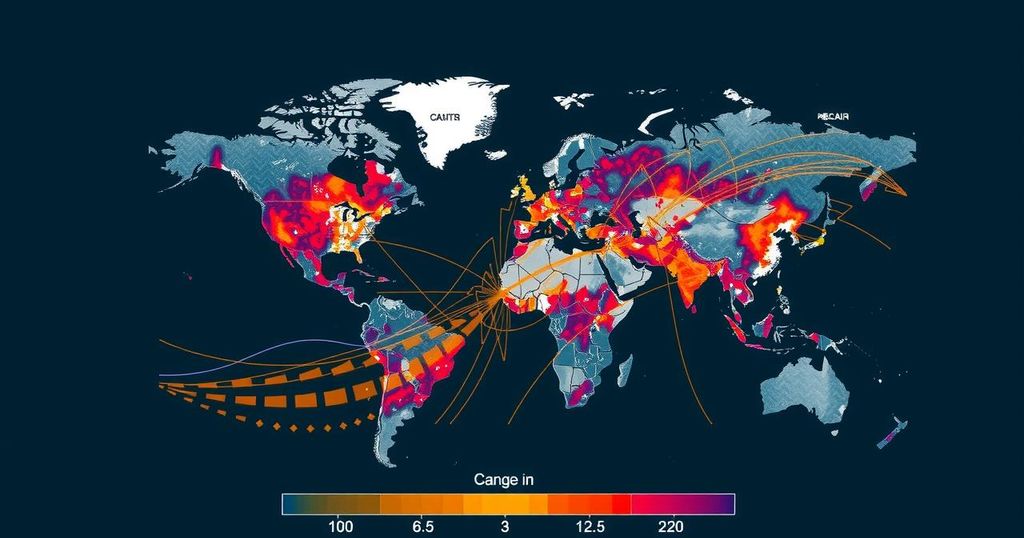The Impact of Climate Change on the Spread of Dengue Fever

Climate change is significantly influencing the spread of dengue fever, with studies indicating that up to 20% of infections can be linked to global warming. Projections suggest this could reach 60% by 2050, particularly affecting regions like Peru, Mexico, and Brazil, where infections could increase by more than 150%. Addressing this issue necessitates comprehensive strategies aimed at reducing carbon emissions and controlling mosquito populations to mitigate public health risks.
The escalating phenomenon of climate change is significantly impacting the spread of dengue fever, a serious mosquito-borne illness associated with considerable health risks, including severe complications and mortality. A recent investigation has established that approximately 20% of global dengue infections can be attributed to climate change, with projections indicating this percentage may surge to 60% by the year 2050 if current greenhouse gas emissions persist. Research encompassing 1.5 million dengue cases from 21 endemic countries across Asia and the Americas revealed that rising temperatures foster optimal conditions for the Aedes aegypti mosquito, the primary vector responsible for dengue transmission. The study identified a temperature threshold at around 84°F (29°C), where dengue transmission peaks due to accelerated mosquito reproduction and enhanced viral multiplication within the hosts. Notably, areas such as Peru, Mexico, and Brazil, experiencing more frequent ideal temperatures for dengue, may witness a staggering increase of over 150% in dengue infections in the forthcoming decades. In contrast, extremely hot locales, like certain southern regions of Vietnam, may experience a decline in mosquito populations due to excessively high temperatures that shorten their lifespans. Public health officials express concern that rising temperatures, combined with increased global travel, could hasten the geographical spread of dengue to temperate regions, rendering it an emerging health threat. Tackling dengue within the context of climate change requires a multifaceted approach, prioritizing both carbon emission reduction to alleviate global warming effects and comprehensive strategies to manage mosquito populations. Researchers advocate for preventative measures, including controlling mosquito breeding sites and enhancing public health initiatives. Urbanization, poverty, and deforestation exacerbate issues, particularly in developing areas lacking adequate sanitation and housing. Innovative strategies such as introducing Wolbachia bacteria into mosquito populations have demonstrated effectiveness in diminishing dengue transmission in regions of Brazil. However, successful implementation necessitates sustained commitment and time. Experts underscore the necessity of integrating dengue mitigation efforts within broader climate action initiatives, emphasizing the importance of safeguarding vulnerable communities and reinforcing healthcare infrastructures as climatic conditions evolve. Simple personal measures such as wearing protective clothing and utilizing insect repellents can also serve to reduce individual infection risks. As global dengue cases continue to rise, the intricate relationship between climate change and public health requires immediate attention and coordinated responses.
Dengue fever, a mosquito-borne illness prevalent in tropical and subtropical regions, is increasingly becoming a public health concern due to its association with severe health complications and potential mortality. This illness is primarily transmitted by the Aedes aegypti mosquito, which thrives under certain climatic conditions. Climate change has been implicated in altering these conditions, leading to increased incidences of dengue worldwide. The interplay of rising temperatures, globalization, and health infrastructure vulnerabilities highlights a pressing need for an integrated response to prevent future outbreaks and manage current cases.
In conclusion, the rise in dengue fever cases is inextricably linked to the ongoing changes in our climate, presenting an alarming health challenge that warrants immediate and coordinated action. Addressing carbon emissions, enhancing public health infrastructures, and implementing mosquito control strategies are imperative to curbing the projected increases in dengue infections. A sustained commitment to environmental health and public safety is crucial, especially as vulnerable communities face the brunt of these challenges.
Original Source: www.natureworldnews.com






